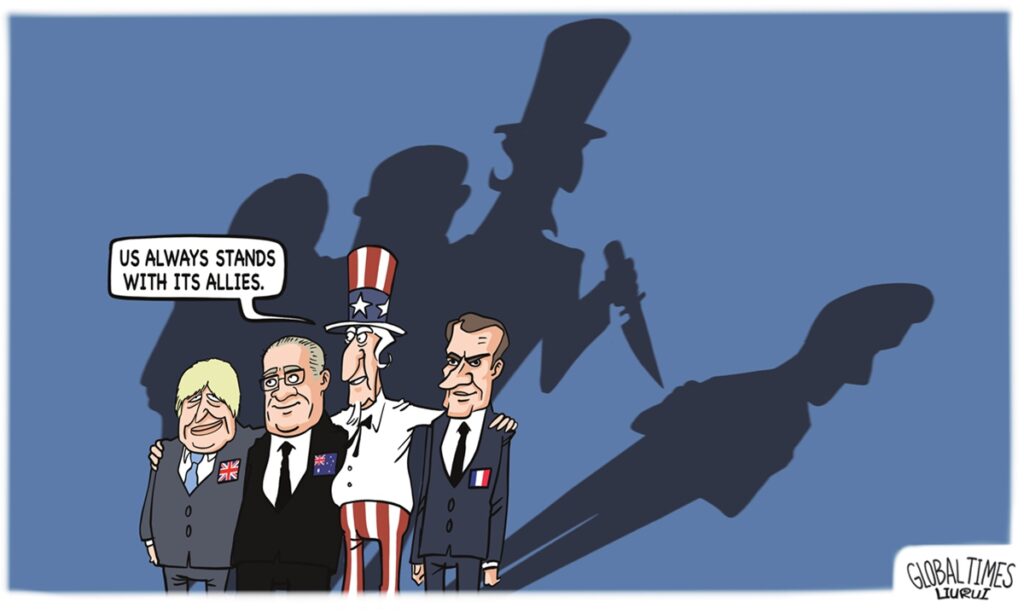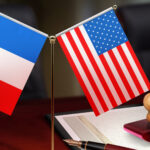US President Joe Biden met with French President Emmanuel Macron at the White House on Thursday local time. The reception was a magnificent one: The state dinner consisted of Maine lobsters, Oregon blue cheese, and military honor guards wearing 18th-century uniforms. The White House brought out all the ceremonial objects it could think of. All this had a slightly unreal feeling: It was a strong contrast with the rift between the US and France on various issues and the criticism of the US Macron made before his trip. And from the French public reaction, it is clear that France wants more than just this “spectacular event.”
Just over a year ago, France was badly betrayed by the US. As a result of Washington’s moves, Australia unilaterally canceled a major submarine deal with France worth tens of billions of Australian dollars and turned instead to the US for the sale. Before Paris had even recovered from the shock and anger, Washington struck again: Biden signed the Chip Act and Inflation Reduction Act (IRA) into law. Although they nominally target China, many countries, including France, feel threatened by it. Macron described the IRA as “super aggressive” toward European companies.
In other words, for Paris, the scars from old wounds have not yet healed, and now new wounds are being inflicted. How can France forget the pain just because of a few hugs and smiles from the White House? This is just a thin piece of paper over deep cracks and wounds; it is not even a band-aid. It is believed that France will not be so naïve and innocent, having already suffered a loss.
At Macron’s insistence, Biden said he was willing to make some changes for US allies regarding the IRA. He did not make any detailed commitments, nor did he hint that he would give up subsidies, only saying that it is “a matter to be worked out.” But everyone knows that phrase is nothing more than a perfunctory delaying tactic. It could not have been more evident when Senator Chris Coons, a Democrat with close ties to Biden, told the media that Macron’s US visit could not “produce miracles for European manufacturers.”
It needs to be emphasized that this is a matter of principle. It is neither a question of whether France or the EU is easily coaxed, nor should it be a private exchange of interests between the US and France or the EU. France and the EU have a responsibility to stand up against, protest, and boycott US behaviors, which flagrantly violates the rules of the WTO, not just because their own interests are harmed.
Even if France and the EU have received the corresponding “compensation” from the US, if they are satisfied or accept the US’ plan to treat the EU differently from other economies, then this means France and the EU retreat from the principles they have always insisted on, losing their morality for the chance of slim profits. This is a result that the international community does not want to see. The fair rules of world trade cannot be broken, and they need to be jointly upheld by all.
These two events have not only brought unpleasant memories to France and the EU, but also reshaped their external perceptions. Washington hopes that Europe will wholeheartedly act as the plasticine that meets the needs of the US national interests. It is expected to maintain a high degree of unity with the US when facing the US’ competitors, and is best divided when facing the US itself. The US worldview is highly unilateral and hegemonic. But Europe has benefited from multilateralism and is a staunch supporter of multilateralism. It does not want to be completely tied to the tracks of the US’ “new Cold War.” The self-awareness shown from time to time in Europe, especially in France and Germany, makes the dominating and pragmatic US feel uncomfortable, so it often bypasses Europe to find more obedient partners, which then makes Europe feel abandoned and oppressed.
The transatlantic relationship is currently in a critical historical period. The steel frame of the bridge supporting it has been severely loosened. The US has neither the will nor the ability to repair it. Washington’s current approach is to bypass some of Europe’s core concerns, use the so-called “consensus” to lure Europe, then frighten it with some “risks,” such as the “challenge” to the common values of the US and Europe, geopolitical competitions and dependence on the industrial chain.
We have noticed that Biden and Macron issued a joint statement after their talks, saying that the two sides should coordinate on concerns “regarding China’s challenge.” They also mentioned “peace and stability” across the Taiwan Straits. By specifically mentioning China in their bilateral relations, the displayed “unity” between the US and France is proven to be false and mixed with impure and even poisonous intentions.
We have no idea when and to what extent Europe will be taken hostage by this low-cost “cooperation” with the US, but it is certain that Europe’s compromise on this “consensus” cannot be exchanged for true friendship with the US. It is not like the blue cheese at the White House state dinner, which can be shared happily. On the contrary, it is more like a bowl of ecstasy soup made specifically for Europe by Washington.
(Global Times)




